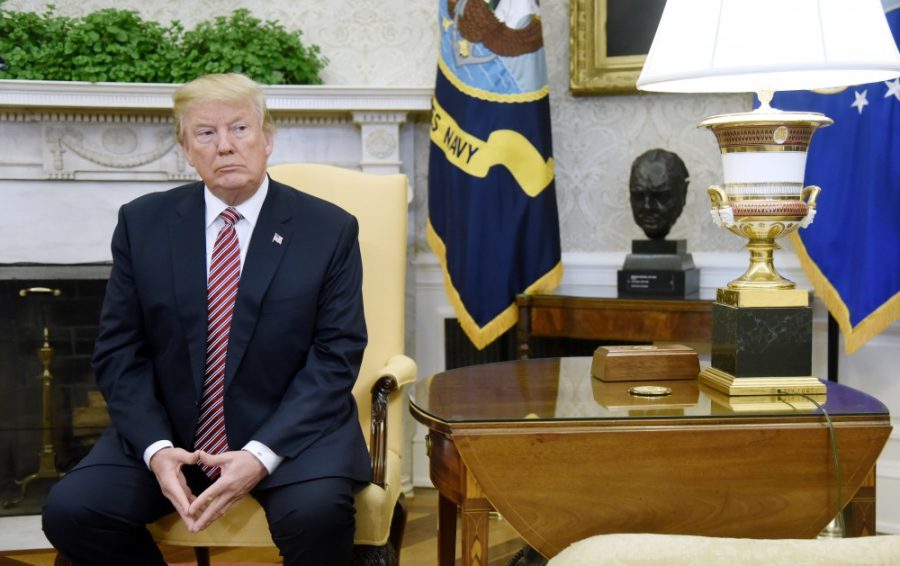Democrats in the U.S. House of Representatives impeached President Donald Trump. What is going to happen next in the U.S. Senate is still anyone’s guess. Based on my experiences, I think American politics is going to get more grotesque and outrageous.
While covering campus politics as a news reporter for the Daily Wildcat, I witnessed a protracted impeachment battle firsthand. University of Arizona’s Graduate and Professional Student Council attempted to impeach their longest-serving member.
The GPSC impeachment saga included election fraud, a police investigation and secret recordings. Sound familiar? From my coverage, I learned two lessons: Impeachments get ugly and, if mishandled, impeachments can threaten the legitimacy of an entire organization.
The two-semester-long saga started with, surprisingly, the resignation of a president. GPSC President Zachary Brooks resigned the presidency, citing personality conflicts on the GPSC Executive Board in the summer of 2016.
The real trouble started when GPSC held a special election the following semester to fill the many empty seats on its general council. Unexpectedly, Brooks was elected as the online college’s representative through 13 write-in votes. Turnout for GPSC elections often fails to reach 5% of the graduate student population.
Christopher Hargraves, GPSC’s acting election director at the time, invalidated Brooks’ victory, however. Hargraves realized that GPSC’s online voting system had allowed all students, rather than just students in online programs, to vote in the election.
Brooks appealed the decision to the GPSC Executive Board, where he found an ally in Jim Collins, GPSC treasurer. While the board could not substantiate fraud, because voting is anonymous, they voted to uphold Hargraves’ decision.
Collins was not happy. There was another flaw in GPSC’s voting system, Collins said. It allowed students who had not paid their tuition in full to vote, in direct opposition to GPSC’s constitution. In Collins’ views, if Brooks’ election had to be invalidated, so did the election of every member of the board. A majority of the board disagreed and the matter was put to rest —
except it was not.
The Daily Wildcat obtained a recording of this closed-door meeting, setting off a battle between GPSC’s big personalities that would overshadow its core mission for months.
The day after my article exploring the additional information revealed in the tapes was published, an impeachment petition was filed against Collins for violating GPSC rules, revealing confidential information and creating a culture of fear and retaliation at GPSC.
At GPSC’s next meeting, Collins, the 19-year veteran of graduate student government, faced his peers and the 30-count impeachment petition.
The impeachment hearing was premature, sloppy and personal. A motion to enter executive session and remove journalists from the room failed to gain a simple majority. GPSC would have to air its dirty laundry in public.
Collins was given only minutes to make his case. He found allies in Mariia Khorosheva, GPSC secretary, and Brandon Smith, a representative for the College of Science.
Daniel Kasper, GPSC assembly chair, and Jasmine Sears, GPSC administration vice president, led the charge against Collins, arguing he failed to perform his duties as treasurer.
In the end, Sears and Kasper fell well short of the necessary votes to remove Collins, but they were not deterred. The circus would continue.
After a winter recess, Sears returned to GPSC with a suite of retroactive term limits that would disqualify Collins and his ally Khorosheva from the upcoming 2017 GPSC general elections. Collins was furious, accusing Sears of a “backdoor impeachment”.
The term limits passed with a majority vote. To stop the term limits from coming into force, Collins turned to GPSC’s Supreme Court, composed of students from the College of Law.
The court ruled that the term limits could be enacted following a re-vote. That same day, a guest speaker attended GPSC’s meeting to present and answer questions following the court’s decision.
With Collins’ future on GPSC all but sealed, he was irate, according to Sarah Netherton, GPSC development administrator. Collins began to argue incessantly with the guest speaker and approached the guest speaker’s chair, Netherton said.
The room became tense, according to a police report from that day. Before Netherton could escort the speaker out of the room, she had to step between the speaker and Collins, who was barring the speaker from exiting.
A few minutes later, UA police arrived and interviewed GPSC members, which culminated in the arrest of Collins for disorderly conduct. The guest speaker filed a No Contact order with the UA but declined to press charges.
GPSC never formally voted to remove Collins. Most of Collins’ remaining alliances on the council soured after his arrest. GPSC did re-vote to pass the term limits at their next meeting, ensuring Collins would never again be able to serve on the council.
After two long semesters of embarrassment and petty personality conflict, GPSC could finally get back to doing its job: to represent and serve graduate and professional students. A year later, GPSC discussed a proposal to eliminate term limits in an effort to help fill the council’s numerous empty seats.









